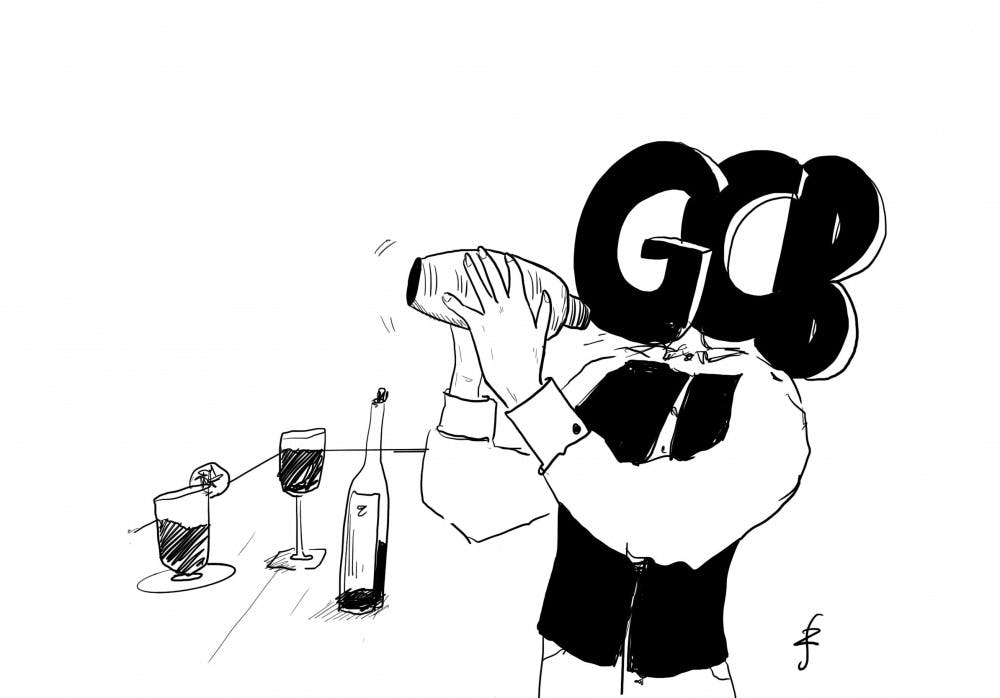Brown Student Agencies will partner with the Graduate Center Bar to host regular two-hour bartending classes for students 21 and older on Saturdays throughout the semester, according a BSA press release. The $60 classes will be taught in the GCB by GCB bartenders.
BSA has already scheduled the first two classes for Feb. 15 and 29. GCB Manager Susan Yund said that the class is something the GCB has always been interested in bringing to campus. Classes — which will be led by Yund and GCB bartender Partick Cull — will cover basic bartending skills, such as how certain drinks are made and the difference between mixed drinks and cocktails. Students will then be able to make and taste their own drinks.
BSA hosted bartending classes several years ago, but the classes were discontinued due to organizational challenges. The original classes were independent from the GCB and taught by outside bartenders. The classes also covered more material and would take up most of the weekend for students.
BSA Strategy Director Max Low ’20 said he had received feedback from students interested in bringing back the bartending classes and believes the new format will be more flexible for both students and BSA. BSA’s Marketing Director Dorothy Windham ’20 added that “Part of (bringing the class back) was realizing that we had the GCB there as a resource and someone we could partner with, because we do like being really involved with the Brown community and it is preferable to do something in a space people are used to with people that they are used to seeing.”
The former bartending class included a Training for Intervention Procedures certification unit in which students were taught skills used by bartenders to prevent excessive intoxication and drunk driving, as well asto identify fake IDs — a certification required for all bar employees. Low emphasized that the new class, in contrast to previous renditions, will focus more on mixology. “(BSA is) trying to make bartending a thing on campus so that people will sort of actively seek out and try to learn” new skills. BSA wants students to take the skills learned in the class and create drinks for their friends.
Both Low and Windham noted that the new, more limited format did not seem to affect the popularity of the class since, as of Jan. 29, the first class was sold out and the second class had only a couple spots left. Yund explained that GCB bartenders are not qualified to teach the TIPS certification, but that there are plenty of outside classes available for students seeking that certification.
Stephanie Kendler ’20 expressed excitement about the upcoming classes. “It would be fun to take the class and have a learning experience in a place we already spend so much time in,” Kendler said.
But some students questioned why the new course was open only to students 21 and older. “The classes should be open to all students 18 and older because in many states you only have to be 18 to work as a bartender, and a class at Brown would provide students with the opportunity to learn a good life skill that can help them find jobs outside of school,” said Michela Savignano ’22. In Rhode Island, bartenders must be 19 or older.
Yund explained that including younger students would be a liability concern, emphasizing the importance of tasting drinks during the course. “In my mind, part of the way that we want to teach is by (saying) ‘try this and then taste it, and see what you think about that experience,’” Yund said. “And if the student is under 21 and they can’t actually taste it … we’re not comfortable with that.”
Some students also wished the class was less expensive. Grace McCleary ’20 felt that the price made the course “inaccessible for many students,” especially now that it does not include a certification. But Low said that BSA is a non-profit but also a business, so students must pay a fee sufficient to cover the goods and services provided. Addressing concerns of accessibility, Low acknowledged that “this is an issue that (BSA is) aware of and (is) actively thinking of ways to overcome.” Windham also cited the Undergraduate Finance Board’s Event Assistance Fund as a resource for students who want to take the class but could not afford it. The fund was created “to assist undergraduate students in participating in student events hosted by UCS-categorized student groups.”
Savignano also suggested that the BSA should consider a group rate for the class. “I wouldn’t pay $60 to take the class by myself, but I think it would be a fun thing to do with your friends, especially if you could sign up as a group and get a discount for it.” Both BSA and the GCB emphasized that they will see how the first class goes and make changes from there. If the first two classes are successful, BSA will offer more classes throughout the semester, Low said.
Correction: A previous version of this story misspelled the name of Stephanie Kendler as Stephanie Keller. The Herald regrets the error.





